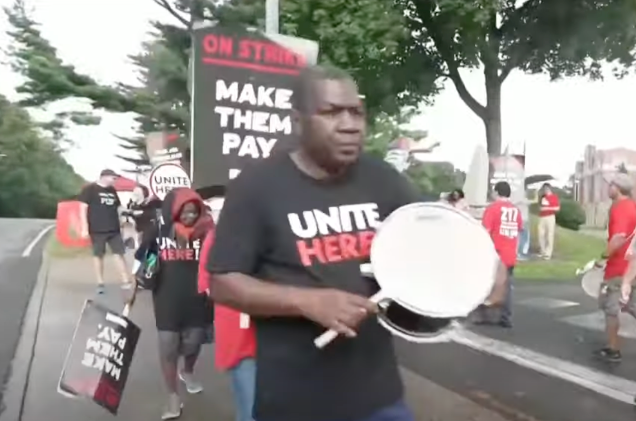News
Striking Hotel Workers Disrupt Labor Day Weekend Across U.S.

Over 10,000 hotel workers walked off the job this Labor Day weekend, disrupting operations at 24 hotels across the U.S. This strike, organized by the union UNITE HERE, comes at a time when travel is at its peak, significantly impacting guests in cities like Boston, San Francisco, and Honolulu. With hotels operating on skeleton crews, services such as room cleaning and dining have been scaled back, leaving many guests frustrated.
What are the Striking Hotel Workers Asking For?
The strikers' demands go beyond just pay increases. They’re calling for the restoration of daily room cleaning services, which were cut during the pandemic. Workers like Aissata Seck, who has been with Hilton Park Plaza in Boston for nearly two decades, are struggling to make ends meet as rents skyrocket. Seck’s story is not unique; many workers have taken on additional jobs just to survive. Another worker, Apple Ratanabunsrithang, highlights the importance of health care benefits in a physically demanding job like hers at Hilton Union Square in San Francisco.
The union argues that while hotels have rebounded financially post-pandemic, the workforce has been left behind. The lack of daily room cleaning has not only cost jobs but also increased the burden on the remaining staff, who are now dealing with rooms that go uncleaned for days.
Management Disappointed by the Strike, Remains Committed to a Solution
Hotel management, while disappointed by the strike, insists they are committed to finding a resolution. Hyatt’s labor relations head, Michael D’Angelo, stated that contingency plans are in place to ensure guests are still served during the strike. Hotels argue that some service reductions, like the cutback on daily room cleaning, are in response to guest preferences and are part of broader efforts to manage staffing challenges in the wake of the pandemic.
In a more detailed response, Hilton Hotels emphasized their efforts to balance the needs of guests with the realities of post-pandemic operations. “We are working tirelessly to ensure that our guests continue to receive the best possible service under these challenging circumstances,” a Hilton spokesperson said. The company also pointed out that they have been increasing wages and benefits to attract and retain staff, but they must also manage operational costs that have soared since the pandemic.
Marriott, another major player in the industry, has also been vocal. “We are committed to negotiating in good faith and finding a resolution that is fair to all parties involved,” said a Marriott representative. However, they also noted that the demands for daily room cleaning are out of step with current guest preferences, with many travelers opting out of daily service for environmental reasons.
Government and Public Reaction to the Hotel Workers’ Strike
The hotel workers strike has not gone unnoticed by government officials. A statement from the U.S. Department of Labor acknowledged the workers' right to strike and emphasized the importance of fair labor practices. “The Department of Labor is closely monitoring the situation. We urge both parties to come to a resolution that respects the workers' contributions to the industry while ensuring that businesses can continue to operate effectively,” the statement read.
Local governments in affected cities have also weighed in. In San Francisco, Mayor London Breed expressed concern over the potential impact on the city’s tourism industry, urging a swift resolution to avoid long-term damage to one of the city's key economic drivers. “San Francisco's economy is heavily dependent on tourism, and this strike is a significant disruption. We encourage both sides to return to the negotiating table and reach an agreement that benefits everyone,” Breed stated.
Impact on Businesses Beyond the Hotels
The ripple effects of the hotel workers strike are being felt beyond the hotel industry. Local businesses that rely on tourism, such as restaurants, shops, and tour operators, are also experiencing downturns in customer traffic. Many tourists, frustrated by reduced hotel services, are cutting their trips short or spending less money during their stay. Some businesses are reporting significant drops in revenue as a direct result of the strike.
In Honolulu, for instance, small businesses near major hotels have seen a noticeable decrease in foot traffic. “We depend on hotel guests for a significant portion of our revenue, and this strike has been tough on us,” said a local restaurant owner. Similarly, tour operators in Boston have had to deal with cancellations and rescheduling requests from tourists whose plans were disrupted by the lack of hotel services.
The strike is also impacting convention centers and event spaces that have partnerships with hotels. Some conferences and events planned for the Labor Day weekend have been scaled back or postponed, leading to financial losses for both the event organizers and the local economy.
Is there a Bigger Picture Somewhere?
This hotel workers strike is part of a larger trend in labor unrest within the industry. Last year’s strikes in Southern California led to significant victories for hospitality and hotel workers, and UNITE HERE hopes to build on that success. With the potential for the strike to expand to more hotels and cities, this Labor Day weekend may be just the beginning of a much larger movement.
As negotiations continue, the question remains: Will hotel management meet the workers’ demands, or will this strike spark further unrest in an industry already grappling with change? Tell us what you think!



